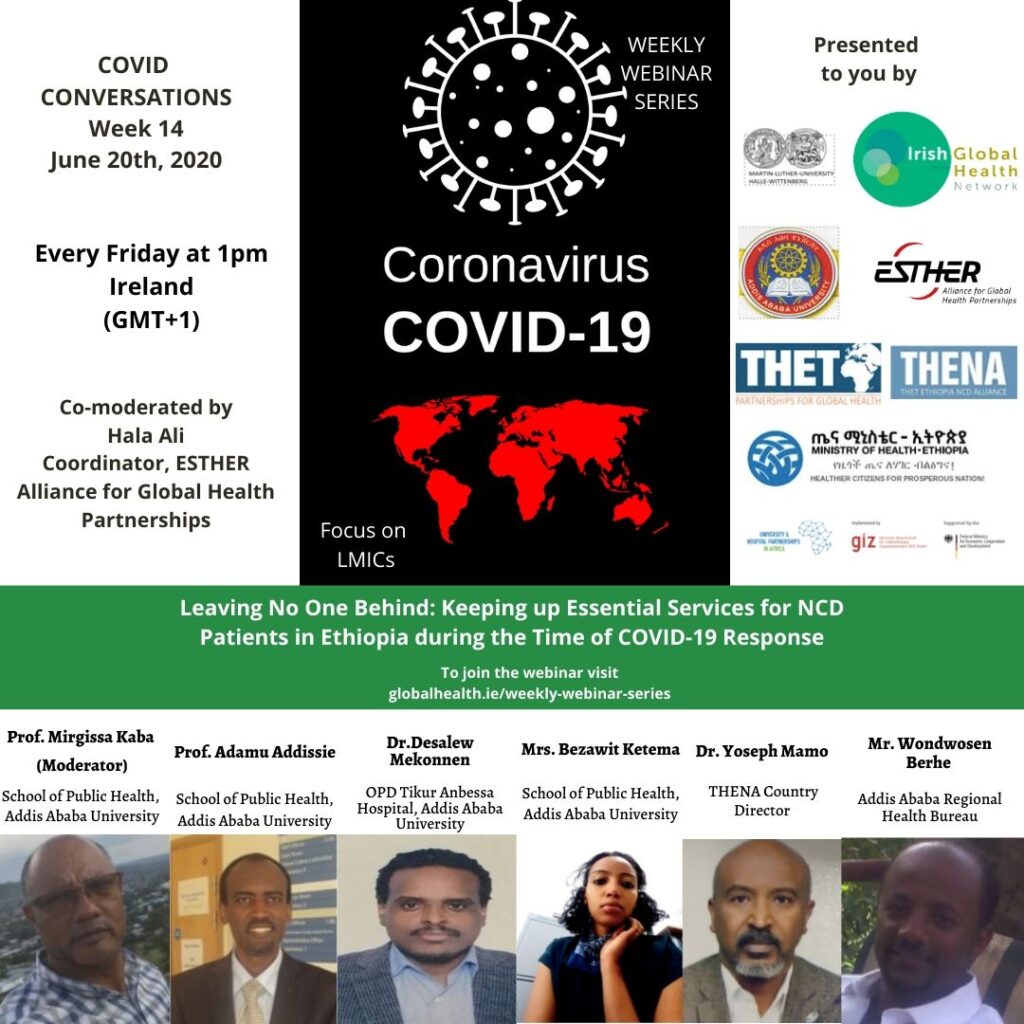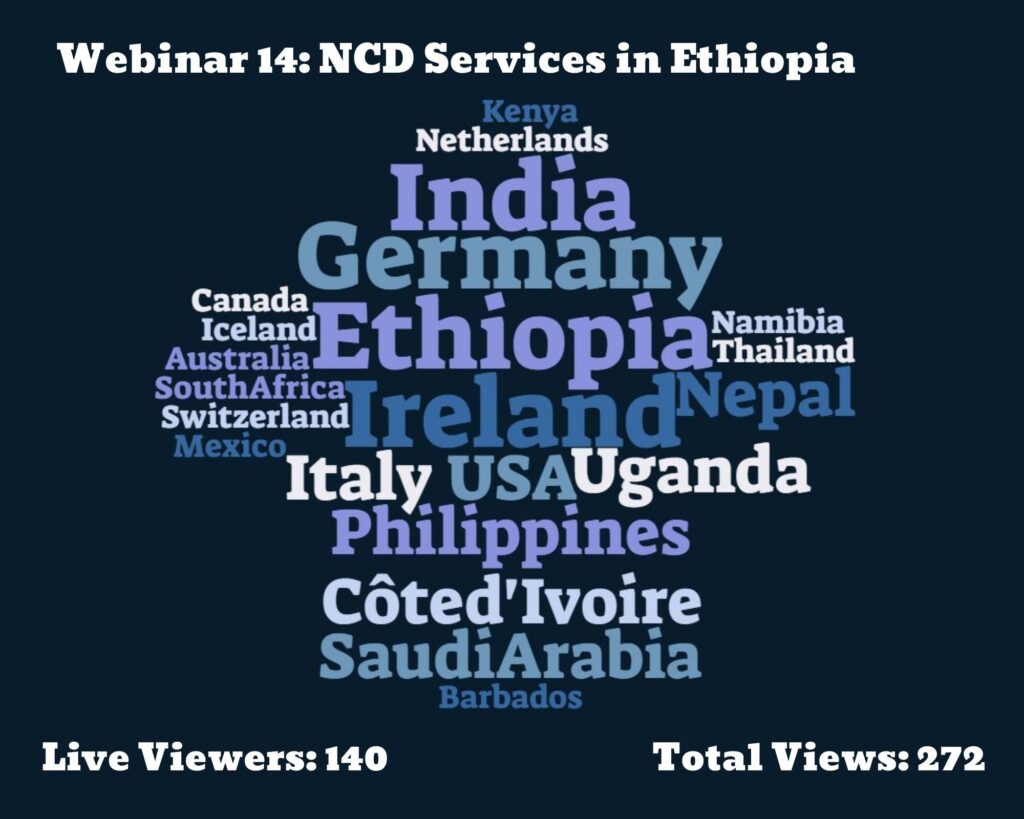Conversations on COVID-19 14th Webinar: Leaving No One Behind – Keeping up Essential Services for NCD Patients in Ethiopia during the Time of COVID-19 Response
 WEBINAR SERIES: WEEK FOURTEEN Leaving No One Behind: Keeping up Essential Services for NCD Patients in Ethiopia during the Time of COVID-19 Response
WEBINAR SERIES: WEEK FOURTEEN Leaving No One Behind: Keeping up Essential Services for NCD Patients in Ethiopia during the Time of COVID-19 Response
The fourteenth webinar was held on Friday 19/06/2020 at 12:00 pm GMT/1PM Irish Time.
This webinar is presented by NCD group of the School of Public Health, Addis Ababa University collaborating with Martin-Luther-University Germany, The Ethiopian NCD Alliance, THET partnerships for Global Health UK, University- and Hospital-partnerships GIZ Germany, hosted by the European ESTHER Alliance & IGHN.
For more information about GIZ, CLICK HERE
For more information about THET, CLICK HERE
The full suite of resources shared by speakers is available under each of their individual recordings, along with a summary of the points they made. A full list of additional resources shared by participants and hosts during the webinar can be found at the bottom of the page.
VIEW THE WEBINARYour feedback is important to us so that we can continue to share learnings, insights and practices relevant to those working in the LMIC community. Please take the time to complete our evaluation at the button below so that we can continue to improve the series.
COMPLETE WEBINAR EVALUATIONA SUMMARY OF POINTS MADE
Dr. Adamu Addissie, Medical Doctor; Preventative Medicine, School of Public Health, Addis Ababa University
Download Dr. Adamu’s Slides here
The first case of COVID-19 in Ethiopia was reported on the 13th of March 2020, and as of this taping, there have been 3954 cases and 65 deaths, due in the main to a sharp increase in recent weeks (See presentation for graph/chart representation of figures). Tikur Anbessa Hospital responded rapidly to the threat of COVID-19.
Addis Ababa is the epicentre of the disease due to overcrowding and population size. The majority of confirmed cases are totally asymptomatic or very mild. The national response has been led by Ministry of Health Ethiopia and the Ethiopian National Health Institute, coordinating guideline distribution, hand-washing facilities, contact tracing and treatment etc. Ethiopia has one of the highest rates of testing compared with population size and cases number globally.
Challenges to disease suppression/prevention include: lack of long term adherence to social distancing measures; lack of access to appropriate hand-washing facilities. Low turn-out to health care facilities during the crisis has been observed, having knock-on health issues. A shortage of PPE has led to healthcare workers being effected at higher rates, and stimga around the disease remains an issue.
- To find out more about Prof. Adamu Addissie, CLICK HERE
Mrs. Bezawit Ketema; PhD cand. at Martin-Luther-University, Halle; Clinical Nurse; Lecturer, College of Health Science, Addis Ababa University
Bezawit and her team conducted a qualitative study entitled “Non-communicable disease management at the time of COVID-19 in Ethiopia: Challenges and Coping Strategies”, with 22 study participants working in the area of NCD management.
Challenges to NCD patients have included: heightened stress and worry surrounding COVID-19; concern about acquiring the illness in healthcare facilities; fewer social interactions/supports for those living with NCDs. Challenges for NCD service providers have included: loss to follow up; decreases in patient flow; worries that clients may discontinue their medication during this time; and disruption to health education services.
Coping strategies for high-risk NCD patients involve staying home at all costs, but that moral is often low. Health care providers’ rely mainly on transitions to virtual services to minimize risk, though challenges to this include a lack of up-to-date contact information for patients. Clinicians recommend community health engagement, such as health care workers testing for COVID-19 house-to-house, to provide additional supports. This study recommends that NCD patients and their specific needs be considered as part of all policy design in the coming months.
Download Mrs. Bezawit’s Ketema Slides here
Dr. Desalew Mekonnen, Consultant Internist/Cardiologist, Outpatient Director at Tikur Anbessa Specialized Hospital
Takur Anbessa Specialized Hospital sees approx. half a million patients per year, the majority of whom live with NCDs. COVID-19 has compounded issues for these patients, reducing travel options, and creating stress and panic among the public and healthcare professionals alike.
In response, phone clinics have been adopted, with clinicians endevouring to contact all patients a week in advance of any in-person booking. However, not all patients have access to personal contact numbers and devices, so continuous assessment of procedures have been conducted to find more ways to contact patients. Assessment shows a great reduction in patients per month between December 2019 and April 2020, and so in addition to phone clinics, doctors have tried as far as possible to actively make contact with those lost to follow up, treating them as their own cohort.
Discontinuation of medication during this time has been a significant issue with fatal consequences for some patients. Experience sharing from other health facilities has been of vital importance, taking guidance from other programmes such as the robust ART programme, which has lost less than 5% of patients to follow up. Programmes with nursing teams that actively follow up with calls to patients have great affect on these numbers also. Collaboration and mentoring between departments, and engaging with community outreach programmes are recommended in future.
Dr. Yoseph Mamo, Leading HPA/THET efforts to support MOH to decentralize of NCD prevention and control program; THENA County Director
The THENA Alliance works to increase access to NCD care in rural Ethiopia, collating experience and knowledge to address hard-to-reach communities. THENA work with a chronic-care model based on HIV care programmes, decentralising through task shifting, task-simplification and quality reporting. They also work to facilitate community healthcare and mass health education. In the past 2 years the Alliance has grown in funding and scale, and Dr. Mamo focuses on healthcare facilities in 6 regions of rural Ethiopia, closely supervised by the department of health. Raising awareness of what NCDs are is a vital step in creating health seeking behaviours among the general population.
COVID-19 has posed additional challenges, though currently within rural areas the cases have not yet been seen at the same scale as large cities. However, fear and uncertainty among health workers and patients alike has been clear and palpable in these areas, with services often coming to a standstill. Rural patients are very wary of travelling to densely populated areas or large hospitals, and restriction of movement and travel has compounded this issue.
Medication and PPE supply chains have been seriously affected, and redeployment of workers to COVID-19 response have had knock-on effects for even the most simple routine NCD procedures eg. Blood-pressure etc. Triage is not established in many of these rural facilities, so efforts were made to rectify this rapidly. Measures to scale up infection control measures have also been implemented, along with transition to telephone communication with patients where possible, and supporting local mask design and creation.
Download Dr. Yoseph’s Brief Powerpoint Here
To find out more about Dr. Yoseph Mamo CLICK HERE
To find out more about Thena CLICK HERE
Wondwosen Berhe, NCD team leader, Addis Ababa Regional Health Bureau
To find out more about Tikur Anbessa Hospital CLICK HERE
Webinar Anchor: Ruairi Brugha, Professor Emeritus, RCSI
To view his contribution, click here
Download Ruairi’s Presentation
Webinar Resources:
- COVID-19 Worldometer
- The Lancet – Has COVID-19 subverted global health?
- The impact of COVID-19 and strategies for mitigation and suppression in low- and middle-income countries
- Equity in response to the COVID-19 pandemic: an assessment of the direct and indirect impacts on disadvantaged and vulnerable populations in low- and lower middle-income countries
- The impact of COVID-19 and strategies for mitigation and suppression in low- and middle-income countries
- Will the Higher-Income Country Blueprint for COVID-19 Work in Low- and Lower Middle-Income Countries?
Maintaining essential health services: operational guidance for the COVID-19 context
FULL WEBINAR ARCHIVE

CATEGORIES
- Equity in Action Blog
- Training Programmes
- Sponsorship
- Vaccine Equity
- Get Global – Global Health Talks
- Student Outreach Team
- Get Global Young Professionals Talk Global Health
- Global Health Matters – Live Event Series
- Global Health Matters – IGHN Live Event Series
- An initiative of Irish Global Health Network
- ESTHER Ireland and ESTHER Alliance for Global Health Partnerships
- Global Health Matters – Webinar Series
- ESTHER
- IGHN Conferences
- Global Health Conference 2020
- Women in Global Health – Ireland Chapter
- ESTHER Partnerships
- Weekly Webinar Series
- 4th Global Forum on HRH
- Access to Medicines
- Archive Page Weekly COVID Webinars
- Clean Cooking 2019
- Climate Change and Health Conference 2017
- Conference Abstracts
- Conference Materials
- Covid FAQ
- COVID Funding Opportunities
- COVID-19
- COVID-19: Gender Resources
- Dashboard and online resources
- Education
- ESTHER Alliance
- Events
- Events & News
- Funding covid
- Global Health Exchange 2018
- Global Health Exchange 2019
- Global Health symposium 2019
- Health Workforce/HRH
- Homepage Featured
- Homepage recent posts
- IFGH 2011-2012 Conference and Events
- IFGH 2014 Conference
- IFGH Multimedia
- Irish AIDS Day 2017
- Irish News and Feeds
- Key Correspondent Articles
- Key Correspondent News
- Maternal Health
- Multimedia
- News
- News & Events
- Newsletter
- Opportunity
- Our LMIC's Resources for COVID19
- Partner Country News and Feeds
- Past Events
- Policy
- Presentations
- Recurring events
- Reports & Publications
- Research
- Resources
- Student Outreach Group
- Students Corner
- TEDTalks
- TRAINING COURSES FOR HEALTH CARE PROFESSIONALS
- Uncategorized
- Upcoming Events
RECENT POSTS

Imagine a world without nurses

Making Therapy Accessible: Reimagining Mental Health Through Traditional Healing and Language by Talha AlAli

Decolonisation as a framework for Youth Partnership in Global Health by Arwa Hany Sharaby

“Fight the bullies!”

SOT Pre-Conference Event 2025

